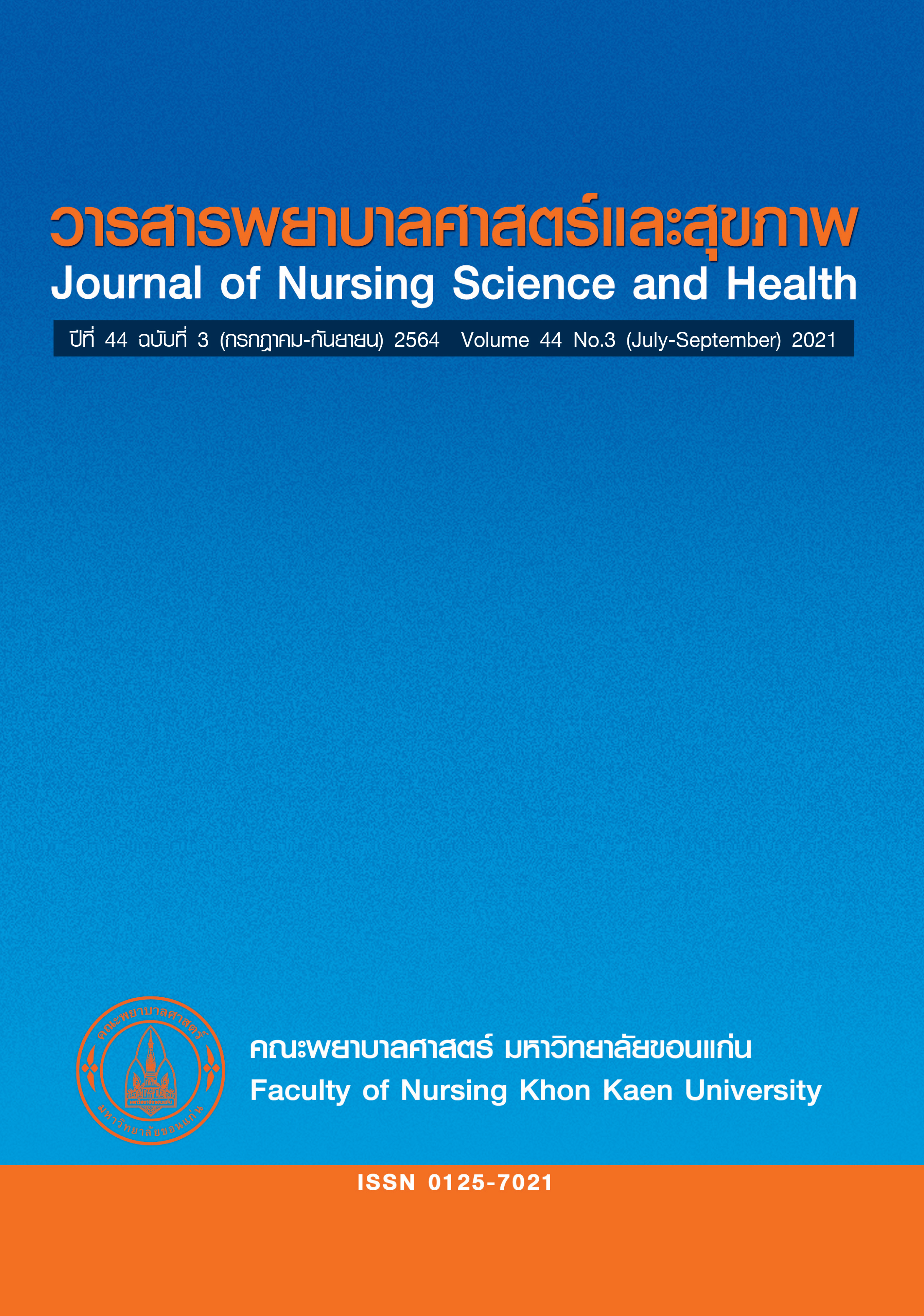ความรู้ ทัศนคติ และการรับรู้พฤติกรรมการส่งเสริมการเลี้ยงลูกด้วยนมแม่เพียงอย่างเดียวนาน 6 เดือนของสามีในภาคตะวันออกเฉียงเหนือ: การศึกษาในโรงพยาบาลตติยภูมิ
คำสำคัญ:
ความรู้, ทัศนคติ, การรับรู้พฤติกรรม, การส่งเสริมการเลี้ยงลูกด้วยนมแม่, สามีบทคัดย่อ
การเลี้ยงลูกด้วยนมแม่มีประโยชน์ต่อมารดาและทารก ระดับความรู้ ทัศนคติ และการรับรู้พฤติกรรมของสามีเป็นปัจจัยที่ส่งผลต่อระยะการเลี้ยงลูกด้วยนมเพียงอย่างเดียวนาน 6 เดือน การศึกษาเชิงพรรณนาแบบตัดขวางนี้มีวัตถุประสงค์เพื่อศึกษาระดับและความสัมพันธ์ของ ความรู้ ทัศนคติ และการรับรู้พฤติกรรมการส่งเสริมการเลี้ยงลูกด้วยนมแม่เพียงอย่างเดียวนาน 6 เดือนของสามีที่มาเฝ้าภรรยาที่มาคลอดบุตรในโรงพยาบาลตติยภูมิของรัฐในจังหวัดขอนแก่น เครื่องมือการวิจัย ประกอบด้วย 4 แบบสอบถาม ได้แก่ แบบสอบถามข้อมูลส่วนบุคคล, แบบสอบถามความรู้การเลี้ยงลูกด้วยนมแม่สำหรับสามี, แบบสอบถามทัศนคติการเลี้ยงลูกด้วยนมแม่สำหรับสามี, แบบสอบถามการรับรู้พฤติกรรมการสนับสนุนการเลี้ยงลูกด้วยนมแม่สำหรับสามี กลุ่มตัวอย่าง ได้แก่ สามีที่มาเฝ้าภรรยาที่มาคลอดบุตร ณ โรงพยาบาลขอนแก่น และ โรงพยาบาลศรีนครินทร์ ระหว่างตุลาคม 2563 - มีนาคม 2564 วิเคราะห์ข้อมูล โดยหาค่าความถี่ ร้อยละ ค่าเฉลี่ย ส่วนเบี่ยงเบนมาตรฐาน และค่าสัมประสิทธิ์สหสัมพันธ์เพียร์สัน ผลการวิจัย พบว่า กลุ่มตัวอย่างทั้งหมดมีจำนวน 185 คน กลุ่มตัวอย่างส่วนใหญ่มีอายุอยู่ระหว่างช่วง 19-29 ปี (46.49 %) หนึ่งในสามของกลุ่มตัวอย่างมีการศึกษาระดับมัธยมศึกษาตอนปลาย/ปวช. (31.35%) มีรายได้อยู่ที่ช่วง 10,001-20,000 บาทต่อเดือน (37.84%) กลุ่มตัวอย่างมากกว่าครึ่งเคยมีบุตร (51.59 %) และมีประสบการณ์การเลี้ยงลูกด้วยนมแม่ (53.51%) ส่วนใหญ่ระดับความรู้ของสามีอยู่ในระดับปานกลาง (mean=19.32, SD=4.82) ส่วนระดับทัศนคติของสามี ส่วนใหญ่อยู่ในระดับปานกลาง (mean=68.58, SD=10.24) จำนวนของสามีมีระดับการรับรู้พฤติกรรมอยู่ในระดับปานกลางและระดับสูงเท่ากัน (mean=108.81, SD=20.39) นอกจากนี้ พบว่า ระดับความรู้ มีความสัมพันธ์ทางบวกกับระดับทัศนคติ และการรับรู้พฤติกรรม (r=0.478, r=0.342) และระดับทัศนคติมีความสัมพันธ์ทางบวกกับการรับรู้พฤติกรรม (r=0.553) อย่างมีนัยสำคัญทางสถิติที่ระดับ .01 ผลงานวิจัยนี้สามารถนำไปเป็นข้อมูลพื้นฐานเพื่อส่งเสริมสามีให้สนับสนุนการเลี้ยงลูกด้วยนมแม่เพียงอย่างเดียวนาน 6 เดือน รวมทั้งสร้างโปรแกรมให้ความรู้และส่งเสริมการปฏิบัติที่ถูกต้องสำหรับสามี
เอกสารอ้างอิง
Couto RG, Dias V, Oliveira LI. Benefits of exclusive breastfeeding: An integrative review. Nursing Practice Today 2020; 7(4): 245-54.
Thophothai T, Thaijinda C, Seartgaikul N, Phuthasri V, Bunthumchareung K, Prakrongsai, P, et al. The study of perception of exclusive breastfeeding promotion and powdered advertisement with knowledge, attitude and decision of mother and relative. Thailand: International health policy program, Ministry of Public Health; 2013. (in Thai)
Semrau K, Kuhn L, Brooks RD, Cabral H, Sinkala M, Kankasa C, et al. Exclusive breastfeeding, maternal HIV disease, and the risk of clinical breast pathology in HIV-infected, breastfeeding women. Am J Obstet Gynecol 2011; 205(344): e1-8.
Tamiru D, Belachew T, Loha E, Mohammed S. Sub-optimal breastfeeding of infants during the first six months and associated factors in rural communities of Jimma Arjo Woreda, southwest Ethiopia. BioMed Central Public Health 2012; v12(363).
WHO. Exclusive breastfeeding. [Database on internet]; 2017 [cited 2019 Nov 28]. Available from:http://www.who.int/maternal_child_adolescent/topics/newborn /nutrition/ breastfeeding/en/
Officeof the National Economic andSocial Development Board. [Database on internet]; 2021 [cited 2021 Sep 20]. 12th national economic andsocialdevelopmentplanof Thailand 2017-2021. Bangkok: Office of the Prime Minister.
Available from: https://www.nesdc.go.th/ewt_dl_link.php?nid=9640
National Statistical Office Thailand (NSO). Multiple indicator cluster survey: MICS4. Bangkok: Statistical forecasting bureau; 2013.
National Statistical Office Thailand (NSO). Thailand multiple indicator cluster survey 2015-2016: Bangkok: Statistical forecasting bureau; 2016.
Thepha T, Marais D, Bell J, Muangpin S. Facilitators and barriers to exclusive breastfeeding in Thailand: A narrative review. Journal of Community and Public Health Nursing 2017; 3(1): 1000160. (in Thai)
Mahesh PKB, Gunathunga MW, Arnold SM, Jayasinghe C, Pathirana S, Makarim MF, et al. Effectiveness of targeting fathers for breastfeeding promotion: systematic review and meta-analysis. BMC Public Health 2018; 18: 1140. Available from: https://doi.org/10.1186 /s12889-018-6037-x
Jama A, Gebreyesus H, Wubayehu T, Gebregyorgis T, Teweldemedhin M, Berhe T, et al. Exclusive breastfeeding for the first six months of life and its associated factors among children age 6-24 months in Burao district, Somaliland. International Breastfeeding Journal 2020; 15(5): 1-8.
Merida Y, Ernawati D. Husband support on working mothers in giving exclusive breastfeeding. Proceedings of the 5th University as Ahmad Dahlan Public Health Conference. Advances in Health Sciences Research 2019; 24: 206-10.
Ouyang YQ, Nasrin L. Father’s knowledge, attitude and support to mother’s exclusive breastfeeding practices in Bangladesh: A multi-group structural equations model analysis. Healthcare 2021; 9(3): 276. Available from: https://doi.org/10.3390/healthcare9030276.
Kaewjanta N, Rungreangkulki S. Working-age northeastern Thai males’ perception of
causes of depression. Thai Journal of Nursing Council 2020; 35(4): 18-34. (in Thai)
Bano R, AlShammari E, Fatima BS, Al-Shammari AN. A comparative study of knowledge, attitude, practice of nutrition and non-nutrition student towards a balanced diet in Hail University. Journal of Nursing and Health Science 2013; 2(3): 29-36.
Wang R, Yang Y, Chen R, Kan H, Wu J, Wang K, et al. Knowledge, attitudes, and practices (KAP) of the relationship between air pollution and children’s respiratory health in Shanghai, China. International Journal of Environmental Research and Public Health 2015; 12: 1834-48.
Panbangpra S, Sangperm P. Knowledge, attitude, and practice of breastfeeding promotion among nurse in private hospitals. Nursing Science Journal of Thailand 2013; 31(1): 70-9. (in Thai)
Kieser M. Methods and applications of sample size calculation and recalculation in clinical trials. Institute of medical biometry and informatics. German: Springer; 2020.
Bich HT, Coung MN. Changes in knowledge, attitude and involvement of fathers in supporting exclusive breastfeeding: A community-based intervention study in a rural area of Vietnam. International Journal of Public Health 2017; 62 Suppl 1: 17-26.
Bich T. Changes in paternal knowledge, attitudes and practice in supporting the first 6 months’ exclusive breastfeeding: Results of a community-based intervention applied social cognitive theory. Journal of Public Health and Development 2017; 1(2): 19–28.
LaMorte WW. Module 9 - Correlation and Regression Evaluating Association Between Two Continuous Variables [Database on internet]; 2021 [cited 2021 Sep 19]. USA: Boston University School of Public Health. Available from: https://sphweb.bumc.bu.edu/ otlt/MPH-Modules/PH717-QuantCore/ PH717-Module9-Correlation-Regression/ PH717-Module9-Correlation-Regression4. html
Jasny E, Amor H, Baali A. Mothers’ knowledge and intentions of breastfeeding in Marrakech, Morocco. Archives de Pédiatrie 2019; 26(5): 285-9.
Binti Ramzaa WIA, Sugumar MAP, Ahmad NB, Lim PY. Factors associated with knowledge and attitude of breastfeeding among staff of faculty of Medicine and Health sciences, Universiti putra Malaysia. Malaysian Journal Of Medicine And Health Sciences 2019; 15: 51–7.
Flacking R, Nyqvist KH, Ewald U. Effects of socioeconomic status on breastfeeding duration in mothers of preterm and term infants. European Journal of Public Health 2007; 17(6): 579–84.
Brown A, Davies R. Fathers’ experiences of supporting breastfeeding: challenges for breastfeeding promotion and education. Maternal and Child Nutrition 2014; 10: 510-26.
Bich HT, Hoa PTD, Ha HT, Vui TL, Nghia TD, Malqvist M. Father’s involvement and its effect on early breastfeeding practices in Viet Nam. Maternal and Child Nutrition 2016; 12(4): 768–77.
Ng RWL, Shorey S, He HG. Integrative review of the factors that influence fathers’ involvement in the breastfeeding of their infants. Journal of Obstetric, Gynecologic & Neonatal Nursing 2019; 48(1): 16–26.
Tadesse K, Zelenko O, Mulugeta A, Gallegos D. Effectiveness of breastfeeding interventions delivered to fathers in low- and middle-income countries: A systematic review. Maternal and Child Nutrition 2018; 14(4): e12612. doi: 10.1111/mcn.12612.
Kaewpoung S, Deoisres W SW. Influencing of perception of pregnancy risk, knowledge, and attitude on preconception health behaviours among pregnant women. The Journal of Faculty of Nursing Burapha University 2018; 26(2): 57-66. (in Thai)
ดาวน์โหลด
เผยแพร่แล้ว
รูปแบบการอ้างอิง
ฉบับ
ประเภทบทความ
สัญญาอนุญาต
วารสารพยาบาลศาสตร์และสุขภาพเป็นเจ้าของลิขสิทธิ์ในการเผยแพร่ผลงานที่ตีพิมพ์ห้ามผู้ใดนำบทความที่ได้รับการตีพิมพ์ในวารสารพยาบาลศาสตร์และสุขภาพไปเผยแพร่ในลักษณะต่าง ๆ ดังนี้ การนำบทความไปเผยแพร่ออนไลน์ การถ่ายเอกสารบทความเพื่อกิจกรรมที่ไม่ใช่การเรียนการสอน การส่งบทความไปตีพิมพ์เผยแพร่ที่อื่น ยกเว้นเสียแต่ได้รับอนุญาตจากวารสารพยาบาลศาสตร์และสุขภาพ



